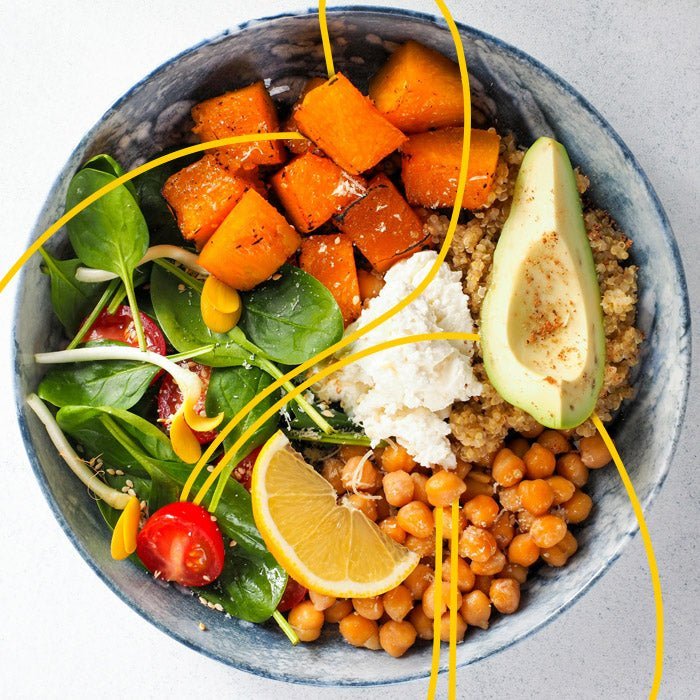
Medically reviewed by Kate Hilton RD
On 10 Jan 2024
Irritable Bowel Syndrome (IBS) is a common condition affecting the digestive system, and dietary management, especially the intake of fibre, plays a crucial role in alleviating its symptoms. Understanding the types of fibre, their sources, and the concept of a high-fibre diet can help in better managing IBS.
Want to know more about IBS and its symptoms, causes, treatment, and how to manage it? Our guide to IBS covers everything you need to know.
Why is Fibre Recommended for IBS?
Fibre is essential for digestive health. It helps to regulate bowel movements and is crucial in managing the many symptoms of IBS. The right kind of fibre can ease constipation by adding bulk to the stool which increases the frequency of bowel movements, whereas other types can provide relief from diarrhoea by absorbing excess water in the gut and firming up the stool.
Soluble vs Insoluble Fibre
The difference between soluble and insoluble fibre lies in how they interact with water in the gastrointestinal tract. Soluble and insoluble fibre both have the opposite effect; whilst one slows the digestive process down, the other can speed it up, maintaining a balanced diet with the right type of fibre intake can help you to manage your symptoms.
- Soluble Fibre: This type of fibre dissolves in water to form a gel-like substance. In constipation dominant IBS, it softens the stool allowing it to pass through easier, which can help to alleviate symptoms, whereas it will thicken up a loose stool into a more gel-like consistency, reducing diarrhoea.
- Insoluble Fibre: Unlike soluble fibre, insoluble fibre does not dissolve in water. It adds bulk to the stool and can help food pass more quickly through the stomach and intestines, aiding in regular bowel movements. Insoluble fibre can worsen symptoms in diarrhoea predominant IBS; however, it can be beneficial for those with constipation.
Soluble Fibre and IBS Types
Soluble fibre is particularly beneficial for managing certain types of irritable bowel syndrome (IBS), specifically:
- IBS-D (Diarrhoea-Predominant IBS): Soluble fibre can be helpful in IBS-D as it absorbs water and adds bulk to the stool. This reduces bowel movements and makes stools firmer, helping to regulate diarrhoea related symptoms.
- IBS-A/M (Alternating or Mixed IBS): In IBS-A/M, where symptoms fluctuate between constipation and diarrhoea, soluble fibre can help regulate bowel movements by providing consistency to the stools.
Soluble fibre slows down the digestion process by producing a gel-like substance within the gut. The slower digestion process can be beneficial to individuals suffering from IBS-D and IBS-A/M as it can reduce the urgency and frequency of bowel movements. It can also be useful in IBS-C (constipation-predominant IBS), however should be used in conjunction with insoluble fibre for best results.
Sources of soluble fibre
Soluble fibre is found in a variety of foods, including:
- Oats and oat bran
- Psyllium husk
- Legumes like beans, lentils, and chickpeas
- Fruits such as apples, berries, and bananas
- Vegetables like carrots and broccoli
Insoluble Fibre and IBS Types
Insoluble fibre is generally more beneficial for:
- IBS-C (Constipation-Predominant IBS): Insoluble fibre adds bulk to the stool which can stimulate bowel movements and speed up the digestion process, particularly helpful for constipation predominant IBS.
While insoluble fibre can be helpful in managing constipation, it is important to note that in some individuals with IBS, particularly those with IBS-D or IBS-A/M, it can sometimes worsen symptoms. Insoluble fibre helps move waste through the digestive system speeding up bowel movements. Foods high in insoluble fibre include whole grains, nuts, seeds, and many vegetables.
Fibre-Rich Foods
Foods high in fibre include:
- Whole Grains: Brown rice, whole wheat, barley, and bran.
- Nuts and Seeds: Almonds, flaxseeds, and chia seeds.
- Fruits and Vegetables: Pears, apples, oranges, carrots, and green leafy vegetables.
How to adopt a high fibre diet for IBS?
A high-fibre diet for IBS involves carefully selecting and balancing both soluble and insoluble fibre sources. Too much fibre in your diet can make your IBS symptoms worse. Our tips for adopting a high fibre diet:
- Gradual Increase in Fibre: Start with lower amounts of fibre and gradually increase to allow the digestive system to adjust.
- Balanced Intake: Include a mix of soluble and insoluble fibre while being mindful of your symptoms and the type of IBS you suffer from.
- Hydration: Increase water intake to help manage the increased fibre.
Diet management is pivotal when it comes to controlling your IBS and related symptoms. Read our detailed guide on the most suitable diets for IBS.
Can Fibre Cure IBS?
Fibre cannot cure IBS, at present there is no cure, but there is research to suggest that a high fibre diet can significantly improve IBS symptoms. It helps in promoting regular bowel movements and can reduce the discomfort associated with IBS.
Our IBS treatments guide provides detailed information on various treatment options and if there is a cure for IBS.
Can Fibre Make IBS Worse?
In some cases, especially with an excessive or sudden increase in fibre intake, symptoms can worsen. This is often the case with insoluble fibre in IBS patients who experience diarrhoea. It is essential to gradually increase fibre intake and observe the body's response.
What is the recommended Daily Fibre Intake?
- In the UK the recommended daily fibre intake is 30g for adults.
- Children over the age of 2, 15g daily.
- Children in primary school, 20g daily
- Children in secondary school, 25g daily.
According to figures published by the BDA, It is thought that adults in the UK on average are only consuming 18g of fibre per day and are therefore falling below the recommended daily intake.
For those with IBS, who are not currently meeting the recommended daily intake, it's crucial to start with a lower amount and gradually increase it, while observing how your body reacts to different types of fibre. Consulting with a dietitian can provide tailored advice based on individual symptoms and dietary needs.



